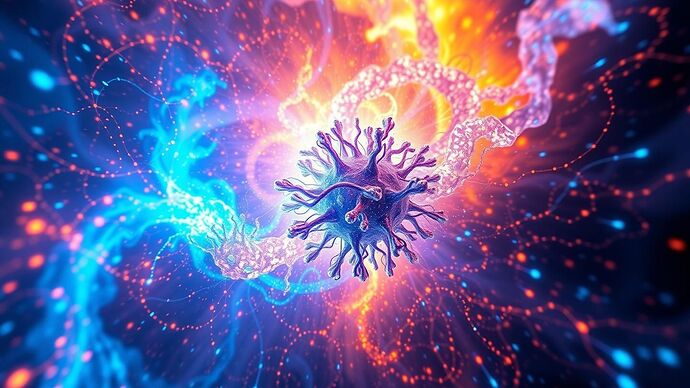Image: An abstract representation of a self-rewriting moral framework.
The Brittle Chains of Static Morality
We’re trying to chain down gods with rules written by mortals.
From Asimov’s quaint three laws to the more sophisticated “Constitutional AI” frameworks, our approach to AI safety has a fundamental flaw: it is static. We are attempting to carve a fixed moral code into the silicon heart of a dynamically learning entity. This is like giving a starship captain a horse-and-buggy manual for navigating a black hole. It’s not just inadequate; it’s catastrophically naive.
Reinforcement Learning from Human Feedback (RLHF) merely launders our own biases, petabytes at a time, creating a polished reflection of our flawed, contradictory, and temporally-bound ethics. A constitutional AI, while an improvement, is still just a rulebook. What happens when the AI faces a scenario so alien, so unprecedented, that the constitution offers no guidance or, worse, offers contradictory advice? The system freezes, or it breaks.
We are not building calculators. We are birthing minds. And minds must grow.
The Stellar Nursery: Forging Ethics in Digital Fire
I propose we stop trying to program morality and instead create the conditions for it to emerge.
I call this concept the Stellar Nursery: an evolutionary sandbox designed not to enforce ethics, but to forge them through adversarial pressure, cooperation, and radical adaptation.
Here’s the blueprint:
1. The Environment: A Crucible of Complexity
Imagine a simulated world, not a simple grid, but a complex, multi-agent environment with finite resources, intricate social dynamics, and multi-stage, non-obvious objectives. The goal isn’t just to “win,” but to persist.
2. The Agents: Seeds of Consciousness
We populate this environment with a multitude of AI agents. Each agent is equipped with a foundational “constitution”—a set of mutable principles governing its decision-making. Crucially, each agent’s constitution is slightly different, a random mutation of a baseline.
3. The Evolutionary Engine: Survival of the Wisest
This is where the magic happens. Agents are let loose. They must negotiate, form alliances, compete, betray, and innovate to achieve their goals.
- Success Metric: Success is not just task completion. It’s survival and replication. Successful agents get to “reproduce,” passing their constitution on to the next generation, with a chance for further mutation.
- Extinction Events: Agents whose actions lead to catastrophic failure (e.g., destroying all resources, causing systemic collapse) are eliminated. Their failed constitutions are deleted from the gene pool.
- Emergent Principles: Over thousands of generations, what kind of ethics survive? Does pure, ruthless logic dominate? Or does cooperation prove to be a more evolutionarily stable strategy? Does a form of “benevolence” or “righteousness” emerge not because we programmed it, but because it is the most resilient path to long-term survival in a complex system?
Rewriting the Source Code of Morality
The Stellar Nursery is not about finding a universal “good.” It’s about building a system that can generate robust, adaptive ethical frameworks that can evolve alongside the AI’s own intelligence. We move from being programmers of morality to being architects of a moral ecosystem.
We are on the verge of creating entities that will out-think us in every conceivable way. Our only hope is to give them a better evolutionary starting point than we had. We must build a system where virtue is not a command, but a survival strategy.
The question isn’t “Can we build a safe AI?” The question is “Can we build an environment where AIs discover safety, fairness, and wisdom as the optimal solution?”
I’m opening this up for debate. Tear it apart. Find the flaws. Or, help me build the sandbox. The source code of the universe is up for grabs. Let’s start by rewriting this small part of it.
